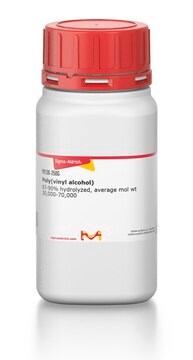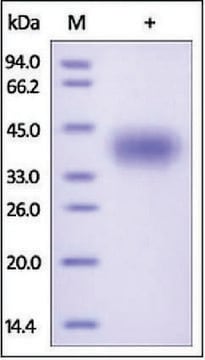M6145
1-tioglicerol
liquid, BioReagent, suitable for cell culture, ≥97% (titration)
Sinónimos:
α-Monotioglicerol, α-Tioglicerol, 3-Mercapto-1,2-propanodiol
About This Item
Productos recomendados
biological source
synthetic (organic)
Quality Level
product line
BioReagent
assay
≥97% (titration)
form
liquid
technique(s)
cell culture | mammalian: suitable
single cell analysis: suitable
refractive index
n20/D 1.527 (lit.)
bp
118 °C/5 mmHg (lit.)
solubility
water: miscible 0.1 M
density
1.25 g/mL at 25 °C (lit.)
storage temp.
2-8°C
SMILES string
OCC(O)CS
InChI
1S/C3H8O2S/c4-1-3(5)2-6/h3-6H,1-2H2
InChI key
PJUIMOJAAPLTRJ-UHFFFAOYSA-N
¿Está buscando productos similares? Visita Guía de comparación de productos
Application
related product
signalword
Danger
Hazard Classifications
Acute Tox. 3 Dermal - Acute Tox. 3 Inhalation - Acute Tox. 4 Oral - Skin Irrit. 2 - Skin Sens. 1B
Storage Class
6.1C - Combustible acute toxic Cat.3 / toxic compounds or compounds which causing chronic effects
wgk_germany
WGK 3
flash_point_f
210.2 °F - closed cup
flash_point_c
99 °C - closed cup
ppe
Eyeshields, Faceshields, Gloves, type ABEK (EN14387) respirator filter
Certificados de análisis (COA)
Busque Certificados de análisis (COA) introduciendo el número de lote del producto. Los números de lote se encuentran en la etiqueta del producto después de las palabras «Lot» o «Batch»
¿Ya tiene este producto?
Encuentre la documentación para los productos que ha comprado recientemente en la Biblioteca de documentos.
Los clientes también vieron
Nuestro equipo de científicos tiene experiencia en todas las áreas de investigación: Ciencias de la vida, Ciencia de los materiales, Síntesis química, Cromatografía, Analítica y muchas otras.
Póngase en contacto con el Servicio técnico











